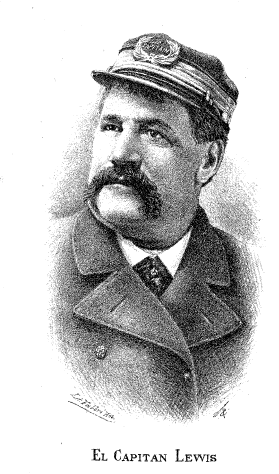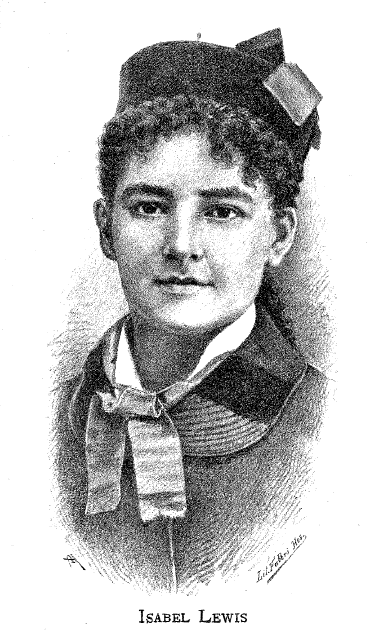Anonymous Crime
The Poisoning of Mrs. Isabel Lewis
“The form is that of a novel, but the argument contains a process of the utmost reality
-the author, Paulino Fuentes Castro
On the 21st of July of 1891, a merchant steamboat named George W. Elder arrived at the Callao Bay, Peru carrying a large shipment of wheat for the Tusso and Sanchez Trading Company. Leading it was Captain C. H. Lewis, accompanied by his wife, Isabel.

The unloading of the ship lasted a few weeks, until it was cleared to go back to sea and return to San Francisco, California, where it came from. While this operation was being carried out, Captain Lewis and his wife disembarked and came into Lima where they became friends with Don Peter Bacigalupi, whom they trusted to guide them, but who was completely unknown to them. Bacigalupi introduced them to some people, among them Don Juan Dockendorff and Don G. Taylor, in Dockendorff’s store which was later devoured by the flames in 1892.
Bacigalupi, an American, had several business ventures, including making excursions on special recreational trains.
Dockendorff, son of American and Peruvianparents, had been educated in the USA, where he married an American. They had recently returned to Peru to take charge of his interests, which had suffered in his absence. He was young, cultured, provocative, with a rich man’s prestige. When he was presented to Isabel, he “caused her a pleasant impression”.
Taylor is an American artist who had recently arrived in Lima and gained a good reputation because of his excellent charcoal portraits displayed in Bacigalupi’s warehouse windows.
A group excursion was arranged to Matucana on the special recreation train. The trip was fast, just a few hours, but quite happy and amusing. Isabel and Dockendorff were inseparable, which did not pass unnoticed by the excursionists.
The unloading of the George W. Elder had finished and it was ready to sail. Departure was set on a July night at nine o’clock, bound for San Francisco, California. Mr. Sanchez, representative of a commercial house and owner of the cargo, accompanied Captain Lewis and his wife on board where they remained until the moment of the departure.
When all was ready, people boarded the boat that was to take them ashore. Isabel expressed a desire to accompany them to the dock, to which the Captain agreed. About a hundred meters away from the ship, the crew threw three cheers, alternately accompanied by three cannons, in honor of farewell to the people who returned ashore.
At the dock, the first assistant of the Port Captaincy, Commander Silva, inquired as to the cause of the cannon shots on board at such an unusual hour and circumstance. Don Angel Sanchez replied to Commander Silva that Captain Lewis had ordered the shots of the George W. Elder because it was customary on the coasts of California when a steamboat bid farewell to a port with no chance of returning to it. The Commander was satisfied with this frank explanation.
Sanchez himself offered a glass of champagne, as a final farewell, to Captain Lewis, his wife and other companions, then went ashore and went to the Piatti Hall. Isabel and Dockendorff refused to drink the glass of champagne and, while the others toasted and talked among themselves, went out to the street alone, where they remained for more than half an hour. The Captain and the other friends who had remained left the Hall heading to the dock to embark. There they found Dockendorff and Isabel having a conversation like those who have become intimate.
* * *
At the end of December of the same year, an American lady checked into a single room on the third floor of the Hotel Maury in Lima. She had a nice figure and had come alone, without the company of any family or servant. This had aroused the curiosity in the tenants and administrators of the hotel because she had taken the room next to a gentleman who was well known to them. They were concerned about the propriety of this location, so they notified the lady that she must take another apartment on a lower floor, so that she would be better watched and attended by employees and stewards.

They could not know, that the guest was Mrs. Isabel Lewis, a married woman. At that time she was apart from her husband and she had important friends. Once they saw her surrounded by Messrs. Dockendorff, Bacigalupi and Taylor, who went to see her and in whose company she was constantly, they began to understand.
She had returned alone to Callao after the trip to San Francisco. She justified her separation from the Captain by saying that she anticipated her husband’s arrival. He was traveling on a sailboat with a cargo of wood and should arrive shortly after her to Callao.
She stayed at Bacigalupi’s house and he had a New Year’s party where she met his friends. She was very well attended by Dockendorff, who had also been invited for the evening. She had the manners of an educated and intelligent person and her beauty, without being extraordinary, was quite seductive and produced the most favorable effects. The young people of the city that knew her, remembered her previous voyage, her visits to Bacigalupi’s store and the trip on the recreational train to Matucana.
Isabel, born in Cincinnati, was still young at 30, and although she had children from her husband, Captain Lewis, her condition of being a mother had not withered the freshness of her clear, rosy, and brilliant complexion. These natural attractions were brought together by the art of dressing and the flirtatiousness of a woman who seeks to please and captivate. However, she had the strongly pronounced expression of people desiring great things. They say she had a fondness for Spiritism. But what we recognize is her intelligence and the energy of her ideas and pleasures that we have been able to know.
In one of her letters written from Lima in which she speaks of a certain person, she said: “if a man wants to know how much he will be missed when he dies, he must sink his finger in the ocean and take it away: as big as the hole is in the sea, so much will he be missed”. This indicates a concept as deep as the bottom of the sea, reveals a superior intelligence, a thinking spirit and a heart capable of harboring the deepest passions of love, indifference and hatred.
Dante, having reached the depths of the human heart and painted all the torments that afflict it and all the feelings that embrace it, has not expressed with greater energy the indifference with which this woman’s soul is capable of looking at a man. It is, then, a plausible explanation that the trip back to Lima could have been induced by a disordered passion and that, under its influence, she would have left country, husband, children and friends, without being guided by any other motive than a blind passionate impulse.
